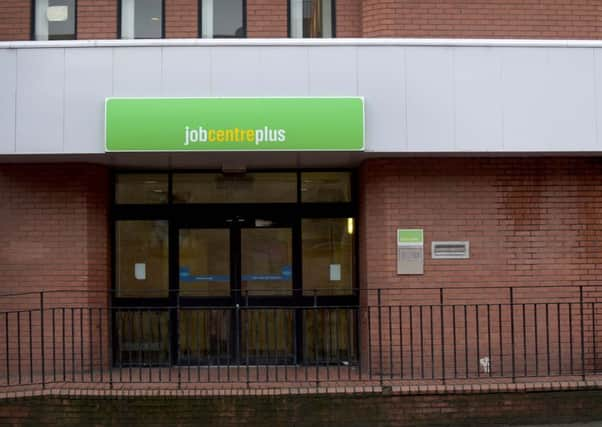Leaders: Unemployment figures conceal bigger picture


At first glance, the announcement that unemployment rates in Scotland have fallen is a welcome piece of good news.
While jobless rates north of the Border are still lagging behind the rest of the UK, the gap in unemployment figures between Scotland and the other UK nations has reduced since April.
Advertisement
Hide AdAdvertisement
Hide AdIn fact, Scotland’s fall represented more than half of the UK’s overall reduction in unemployment, which took the jobless rate to the lowest since 2005.
But if these figures sounds too good to be true, closer analysis is required.
At the same time as unemployment figures have fallen, there has also been a significant fall in employment rates. It can be a confusing concept, but the bottom line is that there has been an increase in economic inactivity, and that is a proper cause for concern.
The labour-market statistics show employment in Scotland fell by 48,000 over the three-month period, and the state of the North Sea oil industry has clearly contributed to this state of affairs.
Scottish Secretary David Mundell pointed out yesterday that the administrations north and south of the Border have to do “everything possible” to mitigate the serious damage caused by the hit the North Sea industry has taken.
Even if the price of oil was to recover, not all of these lost jobs would be regained, and serious attempts must be made to rehabilitate that lost workforce through diversification programmes. Small steps have been taken to help these workers, such as the Scottish Government incentives offered this week to allow those who want to re-train to become teachers. It is a start, but it is still only a drop in the ocean.
And yet some would argue we should be thankful for our lot. What will these regular updates on the unemployment figures look like in coming months if there was to be a Brexit victory? According to Chancellor George Osborne last week, Scotland could lose another 43,000 jobs if the UK voters decide to leave the European Union next week.
With the referendum on the horizon, and polls very close, there is plenty of uncertainty at play which could have an effect on economic performance.
Advertisement
Hide AdAdvertisement
Hide AdBut for the moment, we are where we are, and yesterday’s figures underline the urgent need for both governments to up their efforts.
The dramatic slump in the oil industry could not have been predicted, but it was swift and there may be more job losses to come.
To counter that, ministers must take stock of what growth strategies are being pursued at the moment, and assess their worth. Are they working as intended? If not, why not? It is a time to be frank, and make honest decisions which reflect the reality. We cannot have a situation where one governement is blaming the other. Both are aware of their co-responsibility to address the underlying issues. And without growth, these figures will only get worse - Brexit or not.
Green must be held to account
The debacle surrounding the collapse of BHS continues to defy belief as retail tycoon Sir Philip Green yesterday defended his record at the helm of the High Street chain.
The multi-billionaire apologised to staff for his part in what happened to BHS during a joint hearing of the business and work and pensions select committees yesterday, and so he should. It takes an extraordinary level of mismanagement to bring an institution like BHS to its knees.
Sir Philip was not at the helm when BHS went down, but he undoubtedly played his part. And even though he has apologised, his bullishness was clear when he had the audacity to complain that an MP was staring at him during questioning.
What about the 20,000 employees who are now staring into a pension pot black hole?
Sir Philip blames the company’s demise on former racing driver Dominic Chappell, to whom he sold BHS for the princely sum of £1.
Advertisement
Hide AdAdvertisement
Hide AdIt is clearly too easy for someone to sell up and pass the buck, as this is not the first time this has happened.
When Sir Philip says he wants to find a solution for the 20,000 employees, it must be a full solution, not a compromise.
Yesterday was difficult for him, as shown by the way he squirmed in front of the committee. But he should not think that the worst of this scandal is now over.
The committee chairmen have indicated that they might call him back for further questioning.
They should continue to hold him to account until this unacceptable shambles is put right.